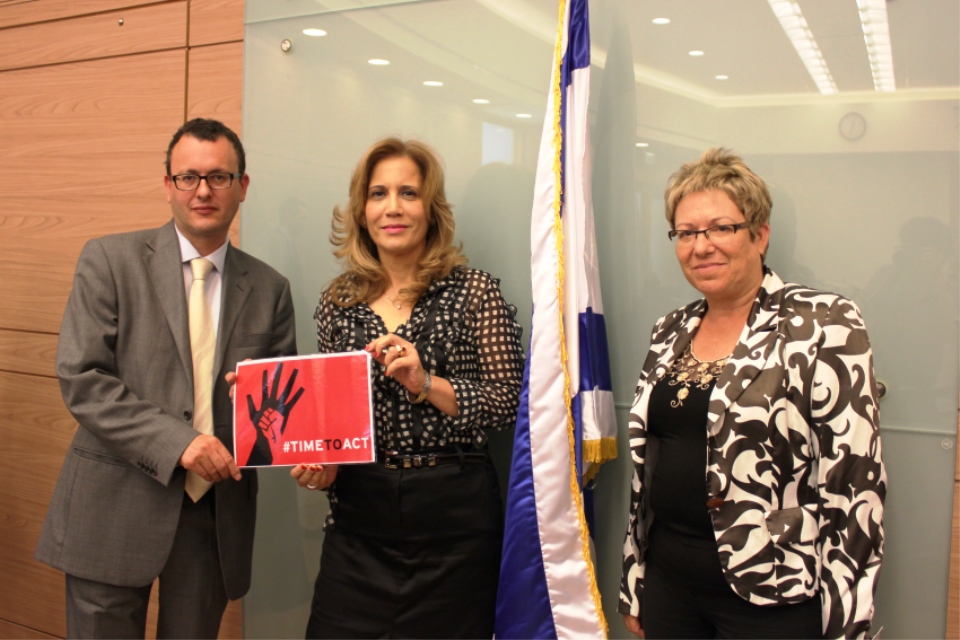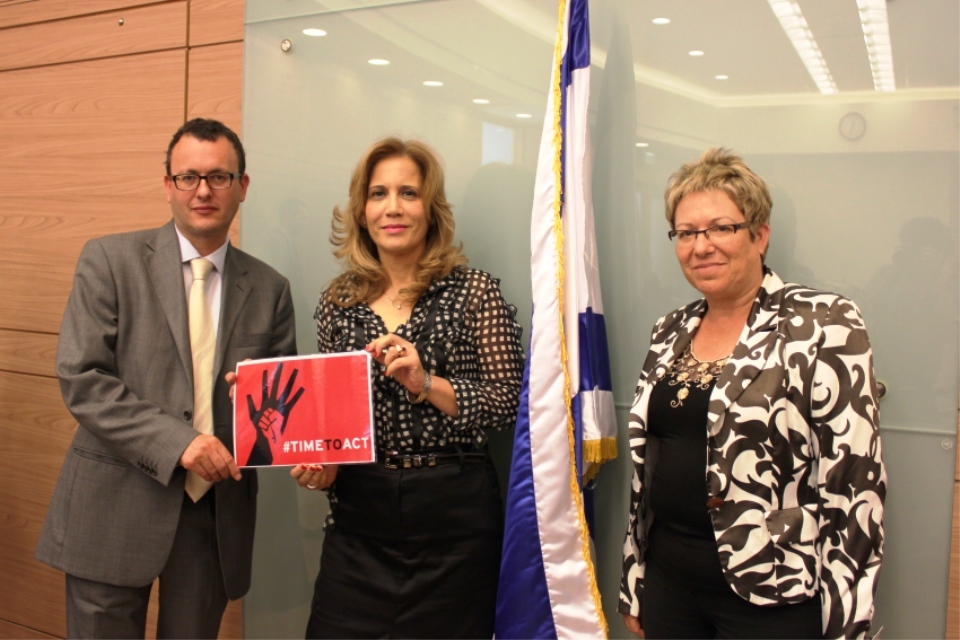Ambassador Matthew Gould speech to the Knesset
Remarks by the British Ambassador to special Knesset session on Prevention of Sexual Violence in Conflict


Ambassador Matthew Gould, MK and Committee Chairperson Aliza Lavie and Vered Swid, General Director of the High Authority for the Advancement of Women at the PMO
MK Lavie, Members of the Knesset, colleagues from the Foreign Ministry, from the Ministry of Justice, the Prime Minister’s office, civil society, academia, and politics.
I want to thank you for hosting this session, which is part of a global chain of events that marks the summit being held in London right now on this issue.
It is a privilege that one of this global chain should a special session in the Israeli Knesset. I am deeply grateful to the Speaker and the Knesset for allowing us to hold this session.
And I want to pay tribute to you, Chair, for your tireless work for the rights of women, both before you entered the Knesset, and since you arrived here.
We are here to send a clear and united message against crimes that are unspeakably evil: the use of rape in conflict. I want talk about three questions: why this issue is important, why this issue is important for us, and what we can do about it.
First, why it’s important.
In our lifetimes millions of women, children and men have endured the horror of sexual violence in conflict, including in Rwanda, the Democratic Republic of Congo, Colombia, Uganda, and Liberia. Even in Europe, in Bosnia, only twenty years ago, rape camps were set up and tens of thousands of women subjected to sexual slavery and forced pregnancy.
We can give thanks that this evil has not happened in our towns, and to our families. But it does not take much imagination to see the pain it causes, and the harm it does – harm that lasts for generations.
To take just one example, in a recent survey of thousands of rapes in the Democratic Republic of Congo, 50% of the survivors were under the age of 17, and 10% were under the age of 10. I have two daughters under the age of 10. I cannot bear to think about the pain that lies behind these statistics.
Or take this figure. 67% of survivors of sexual violence in Rwanda were subsequently found to be HIV positive. Again, it does not take much imagination to understand the life sentence of trauma, stigma and illness that follows, and the impact not just on individuals but on their families and communities as well.
To compound the horror of the original violence, most of its victims never get the recognition or support they need, and end up eking out a precarious existence in conflict zones with their abusers often still at large in their communities.
The second question is why we should act. After all, why does it matter to countries where this – thankfully – is not an evil that confronts people in their everyday lives?
And the answer is clear. A society that believes in human rights for all, and in opportunities for all, cannot know about the way rape is used as a weapon of war and then simply ignore it, wherever it goes on in the world.
What we do affects what happens. Our collective failure to tackle this issue before now has sent a message to those who are orchestrating atrocities today, including next door in Syria. It has sent the message that the world is not interested, that justice will not come, and a penalty will not be exacted. It has created a culture and expectation of impunity – an expectation shared by victims and perpetrators alike.
Led by the British Foreign Secretary, William Hague, and Angelina Jolie, the Special Envoy on the issue, we are taking action now because we believe that we can change things. We are building a wave of public opinion across the world against the use of sexual violence in conflict. There has been an overwhelming response to the #time to act campaign.
The support of countries like Israel and high profile individuals like Bar Refaeli are essential to get the message out, and to convince people - this is important. We need to get people to add their voice to the millions already who have come together to say: enough.
But this brings me to my third question: what are we doing? Tweets, blogs and joint articles with supermodels are all very well, but will they have an impact in the Congo or Liberia?
We can have an impact. History has shown that when the world decides, collectively and powerfully, that something is just wrong, and must be illegal, then it does make a difference.
There has been a tendency in the past to regard sexual violence as an inevitable by-product of conflict, something that happens in the ‘fog of war’ when law and order breaks down.
This is wrong.
We now know that rape is used as a deliberate weapon of war, to terrorise civilian populations, to humiliate, scar and destroy whole ethnic groups or religious or political opponents - cheaply, silently and devastatingly.
To accept that this is part of the cycle of war is to consign hundreds of thousands of innocent people to an appalling fate – now, and in the future.
We know that the world is capable of agreeing that even during war, certain actions are unacceptable.
And that’s the key point.
Our forebears proved it was possible adjust the world’s moral compass. Just think of slavery in the 18th century, and the extraordinary efforts to fight the slave trade.
Or more recently, when the world has come together to ban cluster munitions, and chemical warfare.
We have in the past changed the parameters of what is acceptable and legal in conflict. We have created new moral and legal norms. This has made a difference before. And it can do so again.
We must make clear that rape and sexual violence are outside the boundaries that world is prepared to tolerate, even in conflict. Sexual violence must never again be considered part and parcel of war. It must become known that those who use rape as a weapon of war will be investigated and brought to justice.
Today in London, the world has come together in impressive numbers in an ambitious, unprecedented global summit. Our alliance of 120 countries, civil society and the public are working together on real, actionable solutions.
Solutions like bringing more of the perpetrators to justice by empowering victims to come forward. Solutions like training first responders in the collection of evidence.
If we can say, clearly, and with all the force that the international community can muster – “no more”, then we will make a difference.